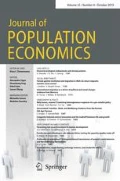Abstract
Studies on immigrants’ disadvantage focus predominantly on labour market perspectives. Immigrants’ poor education is a subject much less examined especially in a cross-national context. This paper examines differences in educational achievement between immigrants and natives across ten OECD countries. In English-speaking countries, immigrants fare best, while in Continental European countries they fare worse compared to natives. Whilst language skills seem to explain immigrants’ disadvantage in English-speaking countries, socioeconomic background and school segregation are further important determinants of immigrants’ gap in Continental Europe. Results presented are predominantly robust across three sources of achievement data: PISA, TIMSS and PIRLS.

Similar content being viewed by others
References
Bedford RD (2003) New Zealand: the politicization of immigration. Migration policy institute. Accessed September 16, 2006 http://www.migrationinformation.org/Profiles/print.cfm?ID=86
Borjas G (1999) Heaven’s door: immigration policy and American economy. Princeton University Press, Princeton, NJ
Brown G, Micklewright J, Schnepf SV, Waldmann R (2007) International surveys of educational achievement: how robust are the findings? J R Stat Soc Ser A (in press)
Castles S, Miller MJ (2003) New ethnic minorities and society. In: Castles S, Miller MJ (eds) The age of migration. International population movements in the modern world. Palgrave, Basingstoke, pp 220–254
Chiswick BR, DebBurman N (2004) Educational attainment: analysis by immigrant generation. Econ Educ Rev 23(4):361–379
Entorf H, Minoiu N (2005) What a difference immigration policy makes: a comparison of PISA scores in Europe and traditional countries of immigration. Ger Econ Rev 6(3):355–376
Frick JR, Wagner GG (2001) Economic and social perspectives of immigrant children in Germany. In: Currle E, Wunderlich T (eds) Deutschland—ein Einwanderungsland? Rückblick, Bilanz und neue Fragen-Festschrift für Friedrich Heckmann. Lucius und Lucius, Stuttgart, pp 299–325
Gang IN, Zimmermann KF (2000) Is child like parent? Educational attainment and ethnic origin. J Hum Resour 35(2000):550–569
Ganzeboom HBG, De Graaf P, Treiman DJ, De Leeuw J (1992) A standard international socio-economic index of occupational status. Soc Sci Res 21(1):1–56
Hanushek E, Kain J, Markman J, Rivkin S (2003) Does peer ability affect student achievement? J Appl Econ 18(5):527–544
Inglis C (2002) Australia’s transformation. Washington: migration policy institute. Accessed September 16, 2006 http://www.migrationinformation.org
Mullis I, Martin M, Gonzalez E, Gregory K, Garden R, O’Connor K, Chrostowski S, Smith T (2000) TIMSS 1999 international mathematics report. Boston College, Boston
Mullis I, Martin M, Gonzales E, Kennedy A (2003) PIRLS 2001 international report. Boston College, Boston
Mullis I, Martin M, Gonzalez E, Chrostowski S (2004) TIMSS 2003 international mathematics report. Boston College, Boston
OECD (2001) Knowledge and skills for life—first results from PISA 2000. OECD, Paris
OECD (2003) Trends in international migration. OECD, Paris
OECD (2004) Learning for tomorrow’s world. First results from PISA 2003. OECD, Paris
Ray B (2003) Canada: policy legacies, new directions, and future challenges. Washington: migration policy institute. Accessed September 16, 2006 http://www.migrationinformation.org
Riphahn R (2003) Cohort effects in the educational attainment of second generation immigrants in Germany: an analysis of census data. J Popul Econ 16(4):711–737
Schmid C (2001) Educational achievement, language-minority students, and the new second generation. Sociol Educ 74:71–87
Van Ours JC, Veenman J (2003) The educational attainment of second generation immigrants in the Netherlands. J Popul Econ 16(4):739–754
Zimmer R, Toma E (2000) Peer effects in private and public schools across countries. J Policy Anal Manage 19(1):75–92
Acknowledgements
Helpful comments and suggestions by John Micklewright, David Culliford, James Raymer and three anonymous referees are gratefully acknowledged.
Author information
Authors and Affiliations
Corresponding author
Additional information
Responsible editor: Klaus F. Zimmermann
Rights and permissions
About this article
Cite this article
Schnepf, S.V. Immigrants’ educational disadvantage: an examination across ten countries and three surveys. J Popul Econ 20, 527–545 (2007). https://doi.org/10.1007/s00148-006-0102-y
Received:
Accepted:
Published:
Issue Date:
DOI: https://doi.org/10.1007/s00148-006-0102-y



